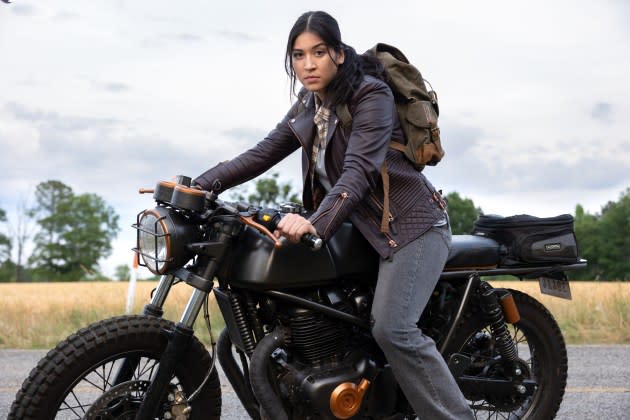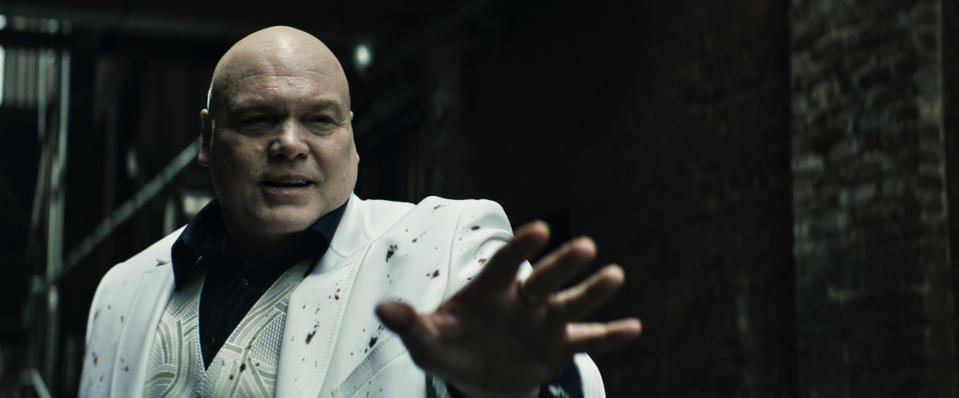‘Echo’ Is One of Marvel’s Best TV Shows in Years. Will People Watch?

All of the signaling around Echo has suggested yet another Marvel Cinematic Universe fiasco in a long line of them in the years since Avengers: Endgame. The miniseries, spinning off a supporting character from 2021’s Hawkeye, was originally set to premiere last November, then got pushed back to an early January window that’s rarely where networks or streamers put their best shows. It is the first binge release of any Marvel Studios-produced series, where Disney+ has previously done very well getting fans to come back week after week to watch and talk about many of its Marvel and Star Wars projects(*). And reviews were embargoed until the moment the show premiered, which is usually a sign of a stinker that someone wants to hide. (Critics also weren’t given the full season, which means these words about only the first three episodes are being published at the exact moment that all five episodes are now available to watch on both Disney+ and Hulu.)
(*) Season Two of What If? got a hybrid release over the holiday break, with one episode being released per day. So there’s definitely some experimentation going on.
More from Rolling Stone
Bernice King Says Her Mother 'Wasn't a Prop' After Jonathan Majors Invokes Civil Rights Icon
How to Watch the Marvel Studios Series 'Echo' and What You Need to Know
Marvel has had a lot of high-profile failures over the past couple of years. Last summer’s tedious Secret Invasion miniseries is the first MCU film or show that it seems not even the most devout fans are willing to defend. The Marvels (an extremely charming, if narratively messy, film) was such a flop that Disney announced within weeks of release that the studio would stop reporting its box office numbers. Once upon a time, audiences not only wanted to see every MCU project, but felt they needed to see them all to fully enjoy each one. But between the sheer number of them, and the lack of quality control of the post-Endgame era, it now feels like homework. The brand’s reputation has gotten so rough in this area that Echo is being released under the new Marvel Spotlight banner, meant for projects where you don’t need to know much, if anything, about the larger MCU. We’ll get back to whether that label applies here, but it’s a dual-edged sword, because it also suggests that the Marvel Spotlight projects aren’t essential viewing.
Put all of this together, and it certainly feels as if everyone at Marvel and Disney is hoping that Echo comes and goes with as little notice as possible, and doesn’t become the subject of additional embarrassing headlines about the precarious state of superhero projects in general and MCU ones in particular.
So it was a pleasant surprise to sit down and actually watch the 60 percent of Echo that I was allowed to see before now, and to discover that it’s actually pretty good — and one of the stronger MCU shows overall when it comes to accomplishing what it sets out to do.
The Marvel Spotlight branding is an odd choice for Better Call Saul writer Marion Dayre’s series. Echo — a.k.a. Maya Lopez (Alaqua Cox), a deaf amputee with impressive ass-kicking skills — was introduced on Hawkeye. Much of the miniseries’ first episode involves events depicted on Hawkeye — some scenes directly replayed here — including the death of Maya’s gangster father William (Zahn McClarnon), and Maya’s falling out with Wilson Fisk (Vincent D’Onofrio), a.k.a. the Kingpin of Crime. There’s even a cameo by Charlie Cox as Daredevil, reprising his role from both the Netflix series he co-starred in with D’Onofrio, and the 2022 MCU sitcom She-Hulk: Attorney at Law. So it’s not self-contained at all, especially with Cox and D’Onofrio set to reunite in the upcoming Daredevil: Born Again show.
But if it explicitly takes place in the MCU, and is being used in part — like almost every other MCU project(*) — to set up someone else’s story, it also feels distinct and separate in many other key ways. Echo is Choctaw. Each of the early episodes begins with a prologue set in an earlier era for the tribe (one of them is presented as a silent movie Western), and Maya’s powers, such as they are(**), allow her to draw on the strength of her ancestors. The bulk of the series is set in Maya’s rural Oklahoma hometown, and the creative team has surrounded Cox (a novice actor who gets by on her innate charisma) with a murderer’s row of veteran Native performers. Devery Jacobs plays Maya’s estranged cousin Bonnie, Graham Greene and Tantoo Cardinal are her grandparents, Chaske Spencer from The English is her crooked uncle Henry, and on and on. As the late, impossibly great FX comedy Reservation Dogs — which at various points employed Jacobs, McClarnon, Greene, lead Echo director Sydney Freeland, and several other Echo actors — showed, there is a wealth of incredible Indigenous talent just waiting for the right opportunities. Echo isn’t aspiring to high art, but the ensemble make Maya’s pulpy world feel completely lived-in, real, and complex, which adds welcome depth and shading to all the kick-kick, punch-punch sequences.
(*) In hindsight, Moon Knight would have been a much better choice to launch the Marvel Spotlight idea, as so far it has zero connection to anything else.

(**) In the comics, she’s called Echo because she has the ability to literally copy the movements and actions of any non-superhuman. Had the MCU version stuck with this, she could fight as well as Shang-Chi, shoot arrows as well as both Hawkeyes, etc. But Taskmaster (who first appeared in Black Widow, and is coming back in the eventual Thunderbolts movie), has the same power, so perhaps it was decided it would be confusing if two unrelated characters were super-mimics.
And each of the first three episodes provides at least one banger in that vein. Perhaps as an homage to the Netflix Daredevil series, the premiere not only features Charlie Cox, but a couple of elaborate fight sequences presented as extended single takes. Other episodes feature impressive combat and stunt work aboard a moving freight train and in and around a Nineties-themed roller rink, each of them more than selling the idea of Maya as a one-woman army who can genuinely threaten the Kingpin’s empire. Because deafness runs in Maya’s family, nearly all of the supporting characters are fluent in sign language, and that ability to communicate nonverbally with loved ones becomes another weapon in her arsenal at times. And her prosthetic leg also turns out to have multiple uses when things get violent.
Now, even the best of the MCU shows like WandaVision and the first season of Loki have ended poorly. All the Marvel Studio shows to date, including this one, were produced in a different model from how TV shows usually get made. Instead of putting the creator in charge of everything, MCU shows have generally hired a writer to pen the first script, then let a director actually run the production, frequently brought in new writers, done lots of reshoots, and then tried to make it all work together in editing. More often than not, this approach doesn’t work all the way through a season. (With Daredevil: Born Again, Marvel will employ a traditional showrunner, finally accepting that they can’t outsmart a production model that the rest of the business keeps using for a reason.) So perhaps Disney+ PR only sending out the first three episodes is less about Echo as a whole than an attempt to only give critics the good parts.
We’ll have to see. Certainly, as Disney management has cut back on the sheer tonnage of MCU product, it’s hard to imagine something as small and specific as Echo getting greenlit today. Most likely, the show won’t make much of a splash, between superhero fatigue, Maya’s obscurity, and the relative lack of star power. But even if things go terribly awry in the last two chapters, I’m glad these first three got made. Whatever the behind-the-scenes process was, the final version comes across just as focused and sure of itself as its title character so often is.
Best of Rolling Stone

